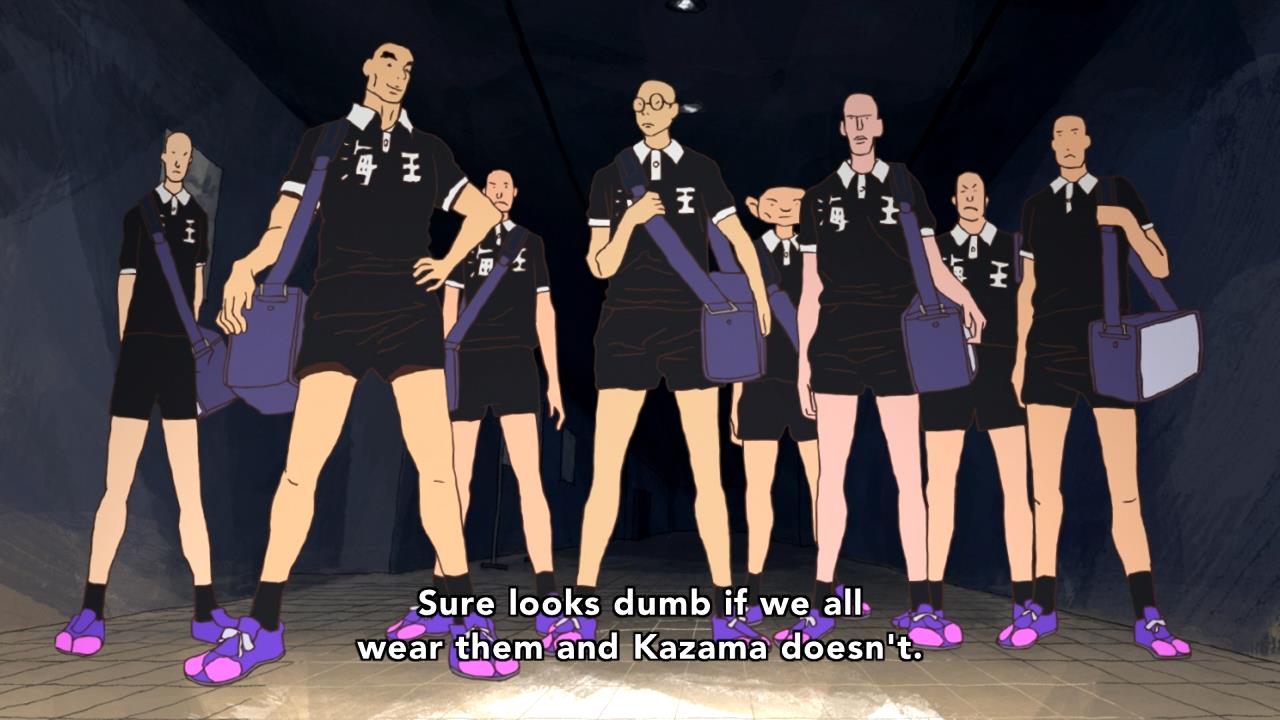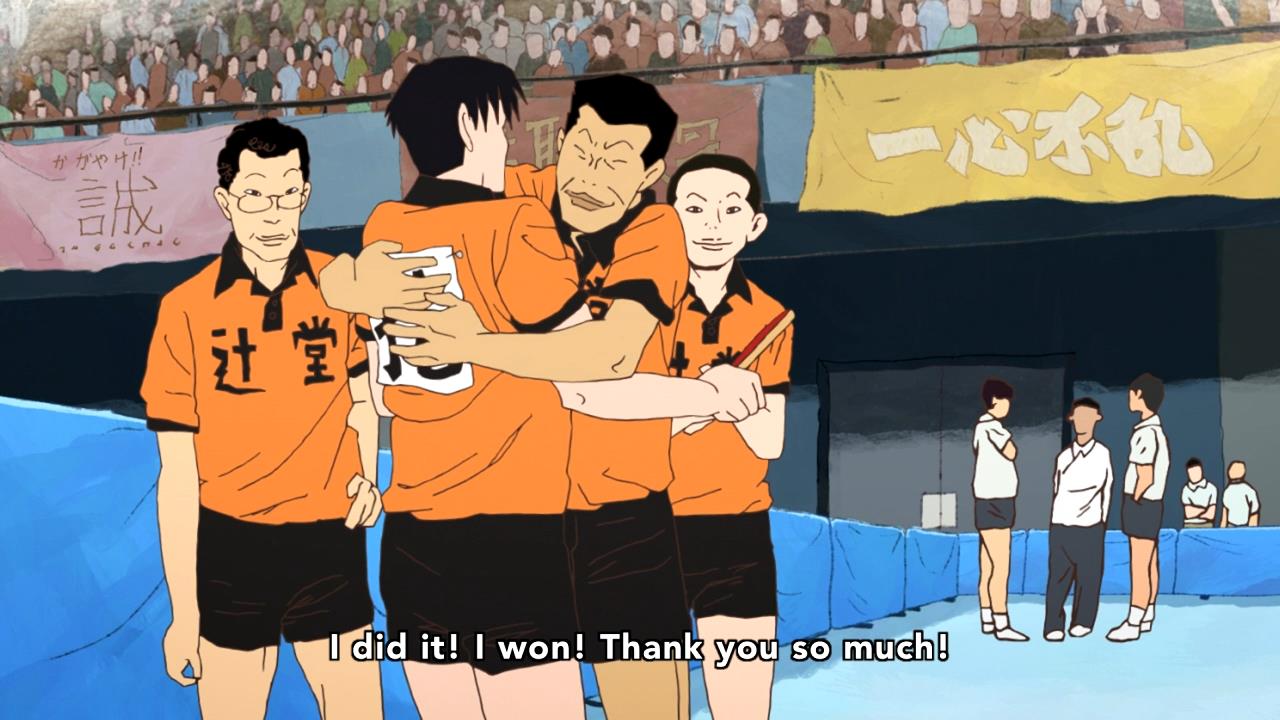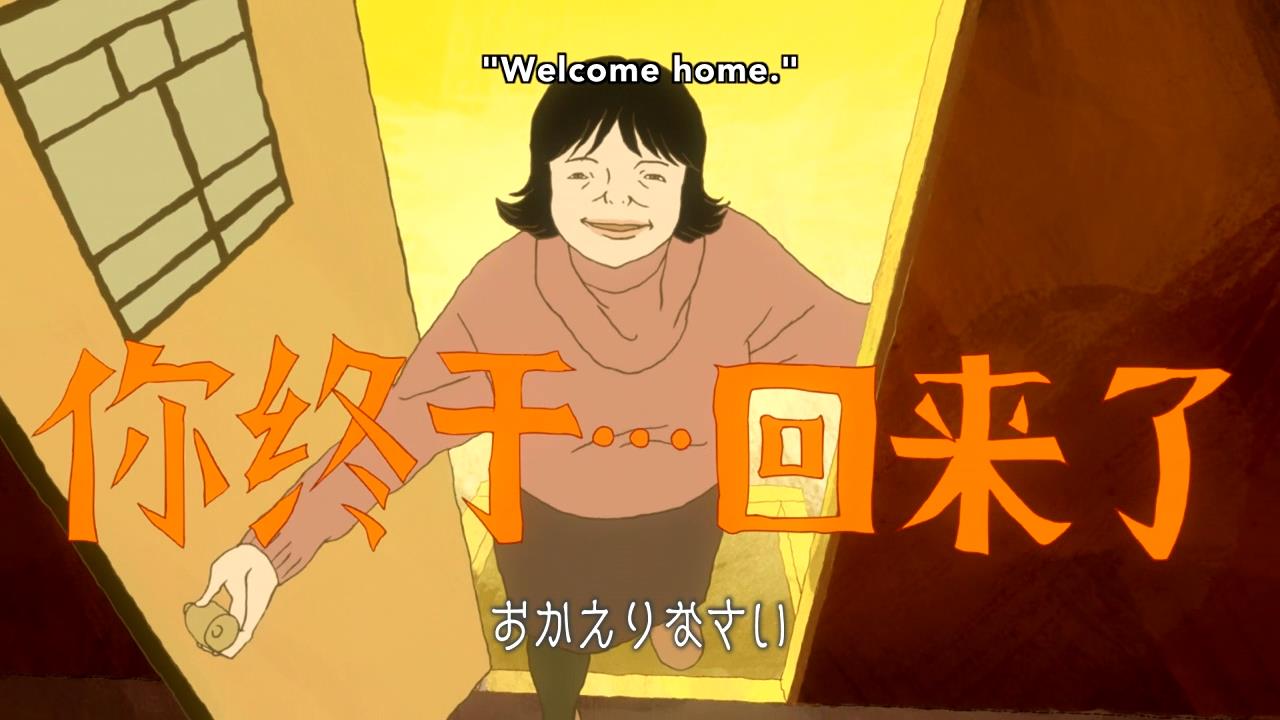This episode of Ping Pong was mostly about shoes.
Kazama’s much-touted Mat Shoes, to be precise. The shoes that are supposed to give you an advantage on competitive mats, which our protagonists today learned would be installed for the big regional tournament. As Kazama’s advertisement says, “They’re completely different” – but in truth, the shoes are merely a confidence placebo. And instead of prompting a wave of shoe-buying in our protagonists, each character’s specific reaction to the mats ends up pretty much describing their journey so far.
Kazama himself makes the boldest statement here. In spite of being the face of the shoes, and acting as the champion of a team that’s all wearing them, he doesn’t wear them himself, and makes no effort to console his teammates regarding this fact. This makes sense, given what we’ve learned of Kazama so far – not only does he not rely on the strength of others (having given up on heroes long ago), but he also doesn’t lend others his strength. His teammates are left abandoned, and we see the consequences when Kong’s first round Kaio opponent begins thinking of his loss only in terms of blame, and whether it’s due to Kaio’s decline. Kazama finds no joy or camaraderie in ping pong, and that is reflected in those around him.
Kong, on the other hand, has learned to deeply value the companionship of those around him, and find strength and happiness in building them up through his support. When his old coach arrives to see the tournament, Kong confidently brags that “my team has actually gotten pretty good this year.” The same brash confidence that defines his character, but now applied not to his own strength and desperate need to win, but the pride he feels in being part of a community he’s helped bring together. This shift in Kong is reflected in his own words to his teammates. He declines to change his shoes (preferring the ones that have carried him here from his home), but tries to maintain their confidence in their choice, saying it’s good for them that they bought high quality shoes. The important thing is not that they made the right or wrong choice – the important thing is that Kong believes in them, and supports them in their decision. That’s a power no designer shoe can offer.
Smile and Peco both remain in their old shoes as well, and the circumstances of this choice are indicative of each of their journeys. Peco cedes to the advice of the trainers he now respects, the trainers who declare “no pro changes their shoes for mats.” And Smile ignores the question when his coach offers it, and instead responds, “More importantly, do you have any strategic advice?” He does not need the false confidence of the shoes, not now that he has a coach he’s come to respect and rely on.
The last act of this episode featured Kong’s final, losing match against Peco, and though I’m sad to see Kong lose, it was a lovely match for him to go out on. He enters the match just after congratulating his teammates on winning their own – he loses it smiling at the fire he’s lit in Peco, backed by the cheers of his friends, and dreaming of returning home. Whereas Smile and Kazama largely demonstrate the power of a hero to inspire others in both its presence and absence, Kong represents the other side of that equation – how gratifying it can be to be that positive influence on others, and how your strength can reside even in the faith you instill in those who believe in you. It is sad to see a character of Kong’s passion and talent end his competitive journey here. But Kong has learned a great deal from ping pong, and he can walk off the mats with his head held high.




Ping Pong has been hitting it out of the park (off of the table?, no that analogy doesn’t make any sense) every week now. Even though I am a huge mecha fan and Captain Earth and Sidonia have been enjoyable for me, Ping Pong is probably going to be my favorite show from this season because of how eloquent it is with its characters. I find myself wanting them all to succeed, and that’s not something I can say of every show that I am watching this season.
They’re all such compelling people! And I love how “succeed” in this show has little to do with whether or not they actually win at ping pong – most of the character development here has come from learning how to lose with grace.
Kong’s final moments were probably my favorite bit of directing in the entire show. All the cuts, and the ping pong ball transforming into the airplane, ending with that shot of his mother…beautifully done.
Yeah, it was a wonderful sequence. A perfect sendoff for his character competitively, and now he can encourage his teammates and watch the other protagonists without regrets.
So far what’s been making this anime so incredible to me is that it does not make the effort to blatantly explain to the viewer, “Look at Kazama, he’s self-centered and doesn’t care about his teammates; look at Kong, he cares for his teammates unlike Kazama! These two characters are contrasts, guys!”, but lets the viewers make the connection themselves in a very natural and beautiful way that displays all the marks of good narrative scripting and excellent presentation.
The most striking part of this episode to me was making the connection between Smile’s hero figure and Peco. Up until that point I thought that the hero was a character fabricated by Smile to personalize what ping pong means to him; I didn’t even think that Peco was the one he was referring to because my opinion of Peco was so (perhaps intentionally) misguided due to his gloating and I-don’t-even-try attitude. It’s nice to see so much incredible character development in each and every episode with such a natural flow to it; it’s like the show is written by “Character Development” and all the incredible action sequences and plot are just bonuses. This show is simply spectacular; I cannot find any fault in it (visual presentation that is different from the norm is not something one should so easily label a “fault”).
Yep, Peco was always his hero, and Smile originally played down his own ability just so he wouldn’t steal confidence from the one who gave him confidence. They have a very interesting relationship.
And I agree, “written by character development” is a good way to describe this and many other great shows. It’s all so completely natural – there is no arbitrary conflict, there is just what happens when a group of people with differing goals and personalities all interact and change each other.
To me that sequence was seeing his dream leave him, leave him behind. He’s here, and the plane’s going away, and so does his old coach, who saw his loss coming.
Yeah, that’s probably right. I guess ‘going home’ was always associated with victory in his mind, and now he’s happy with the community he has here.
I’m not sure he is. It felt like he’s trying to convince his coach that he’s happy, and that it’s all good. But in the end, what he truly wished for was to go home, and then failed.
Heck, when he’s losing, he goes how he wishes his exile were elsewhere, rather than thinking “At least I’ve got my teammates.”
The thing I really love about this show is how much each character’s actions reflect their personality. This episode was really wonderful in this sense with all the shoes stuff.
Also I wanna be Kong when I grow up, he is the best.
Yeah, this show really gets people, but never overstates it.
Pingback: Spring 2014 – Week 9 in Review | Wrong Every Time
Pingback: Ping Pong and the Courage to Fall | Wrong Every Time